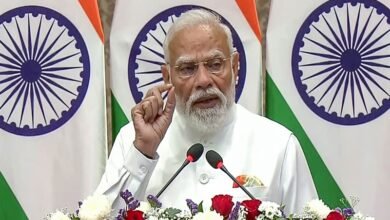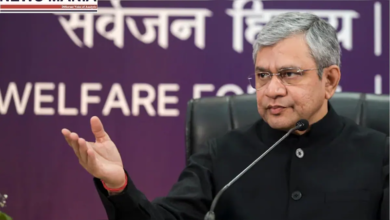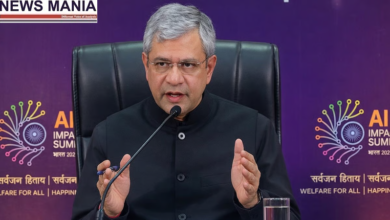Amit Shah Leads Massive Roadshow in Bangalore

News Mania / Agnibeena Ghosh/ 25th April 2024
Amidst a swelling climate protest that has garnered widespread support from Ladakhis and resonated across India, the Bharatiya Janata Party (BJP) has made a significant political maneuver by replacing its sitting MP in the Union territory for the ongoing Lok Sabha elections. The decision underscores the escalating tensions and challenges faced by the BJP in Ladakh, where the climate protest has galvanized public sentiment and eroded the party’s electoral foothold.
On Tuesday, the BJP announced the candidacy of Tashi Gyalson, the current chairman of the Ladakh Autonomous Hill Development Council, as its new contender for the Ladakh seat, replacing sitting MP Jamyang Tsering Namgyal. The move comes in response to mounting discontentment among Ladakhis over unfulfilled promises and perceived neglect by the Modi government, particularly regarding the implementation of the Sixth Schedule in Ladakh.
Namgyal’s victory in the previous elections was predicated on the BJP’s pledge to implement the Sixth Schedule in Ladakh, a commitment that remains unfulfilled. The climate protest, spearheaded by activist Sonam Wangchuk and supported by local leaders and citizens, has emerged as a potent expression of public dissatisfaction with the government’s inaction.
Wangchuk, renowned for inspiring the character played by Aamir Khan in “3 Idiots,” initiated the climate protest on March 4 through a 21-day hunger strike, which subsequently evolved into a rolling hunger strike involving thousands of Ladakhis. Wangchuk’s social media updates have served as a platform for disseminating information about the protest and highlighting alleged government interference, including recent claims of scrutiny by the “anti-money laundering department.”
In a social media post on April 21, Wangchuk revealed receiving an anonymous letter alleging that the bank account details of his institute had been obtained by the “anti-money laundering department.” Additionally, Wangchuk recounted an encounter with an individual claiming to be a government agency employee who warned him of potential risks to his safety and life, suggesting the possibility of orchestrated threats.
Despite these challenges, Wangchuk remains undeterred, asserting his commitment to the cause and expressing willingness to confront potential risks. The climate protest, now on its 46th day, has become a focal point for demanding the enactment of the Sixth Schedule and statehood for Ladakh, as promised by the government.
Meanwhile, sources within Ladakh have reported attempts by the BJP to sway monasteries in its favor, as the majority have pledged allegiance to the climate protest, exacerbating tensions within the party ranks. The BJP’s decision to replace Namgyal with Gyalson reflects a strategic shift in response to the prevailing political climate in Ladakh.
Amidst speculation and uncertainty surrounding the upcoming elections, Ladakhis are grappling with conflicting loyalties and competing narratives. The BJP’s electoral ambitions, once buoyed by promises of autonomy and development, now face formidable challenges amidst a groundswell of discontent and opposition.
The climate protest, initially triggered by local grievances, has evolved into a broader movement confronting issues of governance, accountability, and environmental stewardship. As Ladakhis navigate these complex dynamics, the BJP’s electoral calculus hangs in the balance, with the outcome likely to reverberate beyond the borders of the Union territory.
For the BJP, Ladakh represents a crucial battleground where electoral victories are emblematic of broader ideological and strategic imperatives. However, the party’s handling of the climate protest and failure to address underlying grievances have undermined its electoral prospects, exposing vulnerabilities and fractures within its political apparatus.
In conclusion, the BJP’s decision to replace its sitting MP in Ladakh underscores the growing political tumult fueled by the climate protest and mounting discontentment among Ladakhis. As the elections approach, Ladakh emerges as a microcosm of larger struggles for autonomy, representation, and environmental justice, with far-reaching implications for the BJP and India’s political landscape.






